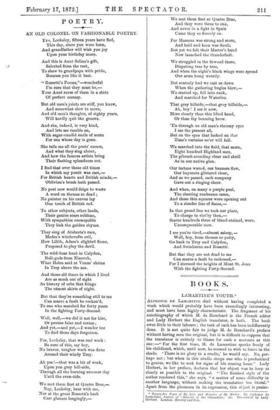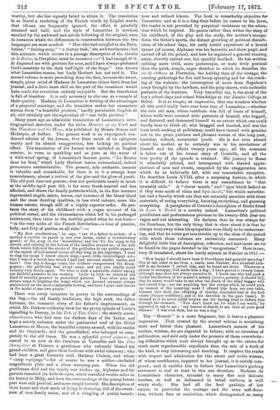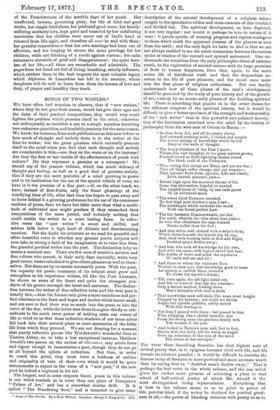BOOKS.
LAMARTLNE'S YOUTH.*
ALPHONSE DE LAMARTINE died without having completed a work which would probably have been exceedingly interesting, and must have been highly characteristic. The fragment of his autobiography of which M. de Rouchard is the French editor and Lady Herbert the English translator, is both. The book owes little to their labours ; the task of each has been indifferently done. It is not quite fair to judge M. de Rouchard's preface without having seen the original, but it is difficult to suppose that the translator is entirely to blame for such a sentence as this one :—" For the first time, M. de Lamartine speaks freely of his childhood, which, until now, he seemed to wish to leave in the shade. There is no glory in a cradle,' he would say. No, per- haps not ; but when in this cradle sleeps one who is predestined to genius, we like to seek for signs of his coming fame." Lady Herbert, in her preface, declares that her object was to keep as closely as possible to the original. "The finished style of the author rendered this," she says, " a matter of some difficulty in another language, without making the translation too literal." Apart from the pleonasm in its expression, this object is praise- Twenly-five Years of My Life, and Memoirs of My Mother. By Alphonse de Lamartine, Author of "History of the Girondists," eze. Translated by Lady Herbert. London: Bentley and Son. worthy, but she has signally failed to attain it. The translation is so literal a rendering of the French words by English words, that idioms are frequently ignored, the effect is painfully strained and bald, and the style of Lamartine is nowhere recalled by the awkward and servile following of the original, even in instances where the differences in construction between the two languages are most marked. " Men who had mingled in the Revo- lution," " fuming soup," " a thorny task," are awkwardnesses ; but this sentence, which occurs in a passage descriptive of the Grotto de la Balme, in Dauphine, must be incorrect :—" I had enough of it. It disgusted me with grottoes for ever, and I have always preferred God's sunshine to the dark hall-light of the frogs." One knows what Lamartine means, but Lady Herbert has not said it. The second volume is more provoking than the first, because the sweet, simple, pious mind of Madame de Lamartine shines forth from her journal, and a little more skill on the part of the translator would have made the revelation entirely enjoyable. But the translation is full of blunders. it is only necessary to cite one as a sample of their quality. Madame de Lamartine is writing of the advantages of a proposed marriage, and the translator makes her enumerate among them "a beautiful position," hardly permissible English at
all, and certainly not the equivalent of " tine belle position."
Many years ago an admirable translation of Lamartiue's auto- biographical sketches, under the titles Memoirs of nay Youth and the Wanderer and his Home, was published by Messrs. Simms and McIntyre, of Belfast. The present work is an expurgated, con- densed edition of the former, free from much of its egregious vanity and its absurd exaggeration, but lacking its poetical effect. The translation of the former work included an English version, in verse as sparkling and as pure as the water of a wild-wood spring, of Lamartine's famous poem, " La Source dans lea Bois," which Lady Herbert leaves untranslated, indeed pronounces untranslatable. The present, sole authentic, memoir is valuable and remarkable, for there is in it a strange keen remembrance, almost a revival of the glee and the glow of youth. The old poet does not posture, does not gesticulate nearly so much as the middle-aged poet did, is far more frank-hearted and less affected, and draws the family portraits which, in the first instance represented angels, saints, heroes, and heroines of the bluest blood and the most dazzling qualities, in less vivid colours, more like human nature, though still of a highly superior order. He pre- faces the story of his childhood with a vague account of his political career, and the circumstances which led to his prolonged retirement, then turns to the terrible period when he was born- " in the very midst of the French Revolution—a time of passion, folly, and fury of parties on all sides" :—
" My first recollections," he says, "are of a father in prison ; of a mother a captive on parole in her own house, under a revolutionary guard ; of the song of the Marsoillaise ' and the Ca Ira' sung in the streets, and echoing in the bosom of the families around us ; of the dull thuds which followed the stroke of the guillotine in our public squares ; of the march of half-scared troops all day long on the highways. I used to sing the songs I heard others sing,—poor, little, unintelligent echo that I was of a world into which I had just entered, amidst smiles and tears ! One day a change came, the soldiers overpowered the dema- gogues ; the guillotine was swept away, and my own family could breathe very freely again. We went to seek a miserable shelter among our faithful peasants in the country. Little by little we obtained the kind of security granted to proscribed persons. Year after year my sisters came to brighten the home which our devoted servants always maintained on the most comfortable footing, and here I grew and throve in the midst of our own people."
There was every incentive to poetry in the surroundings of the boy,—the old family traditions, the high rank, the fallen fortunes, the romantic story of his father's imprisonment, on which Mr. Dickens evidently drew for the pretty episode of Lucie's signalling to Darnay, in his Tale of Two Cities ; the stately aunts, chanoinesses, who had seen the darkest days of the Terror, and kept a saintly seclusion under the patriarchal roof of the Hotel Lamartine at Macon, the beautiful country around, with its castles and its vineyards ; and the grandfather, who belonged so com- pletely to the old times. He was a splendid grand seigneur, as unreal to us now as the furniture at Versailles and the fetes champetres at Trianon, a gentleman who solemnly blessed his grand-children, and gave them bonbons with awful ceremony; who
had been a great favourite with Madame Clairon, and whose " camp equipage "—for of course he was a soldier—included magnificent plate and a silver warming-pan. When the old gentleman died and the family was broken up, Alphonse and his parents removed (in bullock-carts, which travelled twelve miles in six hours) to Milly, and here the surroundings of the young future poet were still poetical, and more simply natural. His description of their house and their mode of living is charming, full of the sweet- ness of true family union, and of a mingling of quaint homeli- ness and refined leisure. The book is remarkably objective fur Lamartine, and as it is a long time before he comes to his loves, the reader is not provoked by perpetual insistence on the adora- tion which he inspired. He paints rather than writes the story of his childhood, of the play and the study, the mother's occupa- tions, the father's sports, the distant growling of political disturb- ance, of his school days, his early horrid experience of a brutal tyrant (of course, Alphonse was his favourite and show pupil, and carried off all the prizes), and how he organized a general running: away, cleverly carried out, but speedily baulked. He has written nothing more vivid, more picturesque, or more truly poeticab than the quick, simple, eager sketches in which he describes the vie de château at Pierreclos, the holiday time of the vintage, the evening gatherings for flax and hemp spinning and for the crack- ing of the walnuts ; the interruption of news from Napoleon's- army brought by the hawkers, and the peep-shows, with authentic portraits of the warriors. Very beautiful, too, is the story of the- boy's school-days and school friendships at the Jesuits' College at Belley. It is so simple, so impressive, that one wonders whether- all this could really have ever been true of Lamartine,—whether the vain old man, whose vestibule was full of busts of himself,. whose walls were covered with portraits of himself, who begged, and flattered, and demeaned himself to an extent which one could hardly bear to think of, who bragged and boasted, and was the least truth-seeking of politicians, could have turned with genuine zest to the green pastures and pleasant waters of this long-past,. harmless, refined, reverential youth. He is not even absurd about his mother, as he certainly was in his revelations of- himself and his affairs twenty years ago ; all the nonsense- is taken out of his former story of Graziella, and all the- true poetry of the episode is retained. His journey to Rome is admirably related, and interspersed with shrewd appre- ciations of men and events, unspoiled by the exaggeration into- which he so habitually fell, with one remarkable exception.. He describes Louis XVIII. after a surprising fashion, in which. it is difficult to believe there is any resemblance to " that unwieldy exile." A "clever mouth," and "eyes which looked as- if they were made of china and lapis lazuli," but which neverthe- less had a faculty which one does not naturally associate with those- materials, of seeing everything, knowing everything, and guessing everything. A paraphrase of Grattan's description of Burke fitted' to Louis is Desire is a novelty indeed. Lamartine's pgliticab proclivities and performances previous to his twenty-fifth year are- vague and not interesting. He declares that he was always for the Bourbons, but the only thing that is clear about it is that he- always went away when his sympathies were likely to be embarrass- ing, and that he never got into trouble up to the close of the period, with which these volumes are exclusively concerned. Many delightful little bits of description, reflection, and sentiment are tee be found in the pages devoted to his "emigrations." Here is one,. very ill translated, about his lonely sojourn at Narnier in 1815 :- "How happy I should have been if Providence had granted me a dog One at last came to me from a castle near Narnier, who attached him- self to me because I petted him, and he found me alone. Whenever a. person is unhappy, God sends him a dog; I have proved it twenty times, although man does not always perceive it. I know one who had such a tender recollection of his master's misery [misers, poverty, it should be],. that he never would take to me after the death of the blind beggar who had owned him ; nor eat anything but the scraps which he could pick up, instead of the tempting meat I offered him from my own table,. because this food, the offspring of charity, reminded him of his first estate [former condition], and of his devotion to the poor [man]. It seemed as if he never could forgive me for having tried to seduce him. through his stomach. ' Yon don't know me for what I am worth,' he. appeared to say to me ; my honour is dearer to me than all your good dinners.' I was rich then, but he was a dog."
The " Memoir " is a mere fragment, but it leaves a pleasant, impression. That created by the second volume is something more and better than pleasant. Lamartine's memoir of his- mother, written, we are expected to believe, with no intention of publication, and sold only under the pressure of those overwhelm- ing difficulties which were always brought up as the excuse for much more reprehensible expedients than the sale of a work of the kind, is very interesting and touching. It inspires the reader with respect and admiration for this sweet and noble woman, of whose confidences, imparted to her journal, it is mainly com- posed ; and it enables him to believe that Lamartine's gashing sentiment is real at least in this one direction. Madame de Lamartine's character, revealed in many fine and delicate touches, as well as delineated in broad outlines, is well worth study. She had all the best qualities of her nation, in particular the courage and the utter self-devo- tion, without fuss or exaltation, which distinguished so many
of the Frenchwomen of the terrible days of her youth. Her unaffected, intense, governing piety, her life of faith and good works, her simple dutifulness, her profound good sense, her keenly- suffering motherly love, kept quiet and consoled by her unfaltering conviction that her children were never out of God's hand or released from His sight, and therefore all must be well with them ; her grateful remembrance that her own marriage had been one of affection, and her longing to secure the same privilege for her children, while not thinking of a revolt against custom ; her calm submissive chronicle of grief and disappointment ; the quiet hero- ism of her life,—all these are remarkable and admirable. The papa from her hand are full of living, breathing, saintly influence, which renders them in the best respects the most valuable legacy which Alphonse de Lamartine has left to his country, whose daughters will do well to learn from them the lessons of love and duty, of prayer and humility they teach.




































 Previous page
Previous page